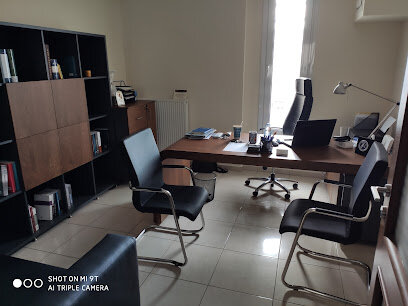Best Transportation Lawyers in Xanthi
Share your needs with us, get contacted by law firms.
Free. Takes 2 min.
List of the best lawyers in Xanthi, Greece
About Transportation Law in Xanthi, Greece
Transportation law in Xanthi covers rules and procedures that apply to road traffic, public transport, passenger services, freight transport and vehicle registration and inspections within the Regional Unit of Xanthi. The legal framework is primarily national - Greek road-traffic legislation and European Union transport rules - while local authorities and the Hellenic Police - Traffic Department handle implementation, enforcement and administrative matters locally. Common local features include KTEO vehicle inspections, KTEL intercity bus services, municipal and regional licensing for taxis and commercial carriers, and police traffic controls on regional and national roads that pass through the Xanthi area.
Why You May Need a Lawyer
Transportation matters can raise administrative, civil and criminal issues. You may need a lawyer in Xanthi if you face any of the following situations:
- A road traffic accident with significant property damage or personal injury where you must claim compensation or defend against a claim.
- Disputes with your insurer over coverage, liability or the amount of compensation for repairs and medical treatment.
- Criminal charges after an accident - for example negligent bodily harm or manslaughter, driving under the influence or driving without a licence.
- Administrative proceedings such as licence suspension, vehicle impoundment, licence points or fines you wish to contest.
- Licensing or regulatory matters for taxi operators, freight carriers or businesses providing passenger transport services.
- Contract disputes involving carriers, logistics agreements, or public-service contracts with local authorities.
- Cross-border transport issues that invoke EU rules, cabotage limits or driver-hour regulations and require specialist knowledge.
Local Laws Overview
This overview highlights the key legal areas that most often affect residents, drivers and businesses in Xanthi. It is a summary and not a substitute for professional advice.
- Road Traffic Rules - The Greek Highway Code governs speed limits, overtaking, priority rules, seat-belt and child-restraint requirements, signalling and use of mobile phones while driving. Local enforcement is carried out by the Hellenic Police - Traffic Department in Xanthi.
- Vehicle Registration and Documentation - Vehicles must be registered and carry valid registration documents and proof of insurance. Registration and administrative services are handled by the transport department of the Regional Unit of Xanthi.
- Vehicle Inspections - Periodic mandatory technical inspections (KTEO) apply to passenger and commercial vehicles. A valid KTEO certificate is required for roadworthiness and to complete certain administrative transactions.
- Insurance - Compulsory third-party liability insurance is required for all vehicles operating on Greek roads. Insurers handle claims for property damage and personal injury; serious disputes often require legal assistance.
- Driver Licensing - EU driving licences are generally recognised. Non-EU licences may require an International Driving Permit or local conversion depending on residency. Professional licences or permits apply for certain commercial activities.
- Taxis and Public Transport - Taxi licences and municipal permits regulate taxi operations. Intercity bus services are typically provided by KTEL cooperatives; public-service contracts and consumer rights are regulated at regional and national level.
- Commercial Transport - Road freight operators must comply with EU driver-hours, tachograph rules, vehicle weight limits and licensing for domestic and international carriage. Dangerous goods transport requires ADR compliance and specific permits.
- Traffic Offences and Penalties - Fines, administrative sanctions and, for serious cases, criminal proceedings can result from speeding, driving under the influence, reckless driving or causing injury. There are formal procedures for paying or contesting fines.
- Accident Reporting and Liability - Drivers must stop, assist if there are injuries and exchange details. Serious accidents must be reported to police. Liability is decided on fault principles and often resolved through insurer negotiation or court action where necessary.
Frequently Asked Questions
What should I do immediately after a road accident in Xanthi?
Prioritise safety and health - check for injuries and call emergency services if needed. Move to a safe location if possible. Exchange names, contact details, vehicle registration numbers and insurance information with other parties. If there are injuries or significant damage, inform the Hellenic Police - Traffic Department so an official report can be made. Take photos of the scene, vehicles and road conditions, collect witness contacts and notify your insurer as soon as possible.
Do I need a local lawyer for a small traffic claim?
For minor claims you may resolve matters directly with insurers or pay a fine. However, even apparently small claims can involve hidden medical issues or disputed liability. A local lawyer in Xanthi can advise whether legal costs are likely to outweigh benefits and can handle negotiations with insurers or represent you in court if needed.
How long do I have to report an accident to the police or insurer?
Serious accidents with injuries should be reported to the police immediately when possible. Notify your insurer promptly - many policies require prompt notice to preserve rights. There are legal time limits for bringing civil claims, so seek legal advice early. Acting quickly preserves evidence, witness memory and administrative options.
What are the rules on driving with a foreign driving licence in Xanthi?
EU and EEA licences are generally valid in Greece. Holders of non-EU licences may be able to drive for a limited period with an International Driving Permit or may need to exchange their licence if they become Greek residents. Requirements vary by nationality and residency status, so confirm your situation with a local authority or legal adviser.
What is KTEO and when is an inspection required?
KTEO refers to mandatory vehicle technical inspections for roadworthiness. New and used vehicles, and vehicles at set age or mileage intervals, must pass KTEO checks. Commercial vehicles and vehicles with modifications often have additional inspection requirements. Driving without a valid KTEO certificate can lead to fines and affect insurance coverage after an accident.
What are the consequences of driving under the influence in Greece?
Driving under the influence can lead to fines, licence suspension, vehicle seizure, and criminal charges in cases causing injury or death. Legal blood alcohol limits include stricter thresholds for professional drivers and new drivers. Penalties depend on the level of intoxication, consequences of the incident and whether criminal elements are involved - seek a lawyer immediately if charged.
How do I challenge a traffic fine issued in Xanthi?
Traffic fines can be paid to accept the sanction or contested through administrative or judicial procedures. The fine notice will specify how to contest it and the relevant deadline. Preserve evidence such as photos or witness statements and consider legal assistance to prepare and submit an effective appeal within the time limit.
What happens if someone is injured in an accident - how is compensation handled?
Compensation typically involves insurer negotiations based on fault and the level of injury, medical costs, lost earnings and pain and suffering. For serious or disputed cases, claimants often bring civil actions in court. Criminal proceedings may run parallel if negligence or unlawful conduct is alleged. A lawyer can help document damages, communicate with insurers and represent you in court.
Are there special rules for freight or commercial carriers operating from Xanthi?
Yes. Freight operators must comply with EU and national rules on driver-hours, tachograph use, vehicle weight and dimensions, licensing, and permits for international transport. Transporting dangerous goods requires ADR certification. Local businesses must also meet tax, social security and commercial regulations. Non-compliance can lead to administrative fines or suspension of operations.
How do I find a qualified transport lawyer in Xanthi?
Look for a lawyer or law firm with experience in traffic accidents, insurance claims, administrative law and commercial transport law. Check professional qualifications, local experience in Xanthi courts and with regional authorities, client reviews and whether they offer an initial consultation. Ask about fees, case strategy and likely timelines before engagement.
Additional Resources
Below are types of local and national bodies and resources that can help with transportation issues in Xanthi:
- Regional Unit of Xanthi - transport and administrative services for vehicle registration and local permits.
- Hellenic Police - Traffic Department in Xanthi - for accident reports, traffic enforcement and immediate assistance after collisions.
- Ministry of Infrastructure and Transport - national rules, licensing frameworks and transport policy.
- KTEO inspection centres serving Xanthi - for mandatory vehicle inspections and roadworthiness certificates.
- KTEL Xanthis - local intercity bus operator for public transport questions and passenger rights.
- Local municipal offices - for taxi licensing, local road permits and municipal transport regulation.
- Insurance companies operating in Greece - for claims handling and information on compulsory cover.
- Port and customs authorities - where freight crosses regional borders or uses nearby ports for international transport.
- Professional associations and unions for drivers and carriers - for sector-specific advice and collective guidance.
Next Steps
If you need legal assistance with a transportation matter in Xanthi, use the following checklist to organise the process:
- Secure safety and medical care if the matter involves an accident or injury.
- Gather all documentation - police reports, insurance details, vehicle registration, KTEO certificates, photos, witness contacts and medical records.
- Notify your insurer promptly and follow their initial instructions, but avoid signing full settlement documents before legal review if injuries or liability are disputed.
- Contact a local lawyer experienced in transport law for an initial consultation - ask about case experience, likely costs, timeline and strategy.
- If you plan to contest a fine or bring a claim, act quickly - administrative and statutory deadlines apply and evidence may become harder to obtain over time.
- Keep detailed records of communications, expenses and treatment related to the incident or dispute.
- Consider alternative dispute resolution - mediation or negotiated settlement - where appropriate, as these can be faster and less costly than court.
Engaging a qualified local lawyer early will help protect your rights, meet procedural deadlines and improve your chances of a favourable outcome in administrative, civil or criminal matters related to transportation in Xanthi.
Lawzana helps you find the best lawyers and law firms in Xanthi through a curated and pre-screened list of qualified legal professionals. Our platform offers rankings and detailed profiles of attorneys and law firms, allowing you to compare based on practice areas, including Transportation, experience, and client feedback.
Each profile includes a description of the firm's areas of practice, client reviews, team members and partners, year of establishment, spoken languages, office locations, contact information, social media presence, and any published articles or resources. Most firms on our platform speak English and are experienced in both local and international legal matters.
Get a quote from top-rated law firms in Xanthi, Greece — quickly, securely, and without unnecessary hassle.
Disclaimer:
The information provided on this page is for general informational purposes only and does not constitute legal advice. While we strive to ensure the accuracy and relevance of the content, legal information may change over time, and interpretations of the law can vary. You should always consult with a qualified legal professional for advice specific to your situation.
We disclaim all liability for actions taken or not taken based on the content of this page. If you believe any information is incorrect or outdated, please contact us, and we will review and update it where appropriate.












